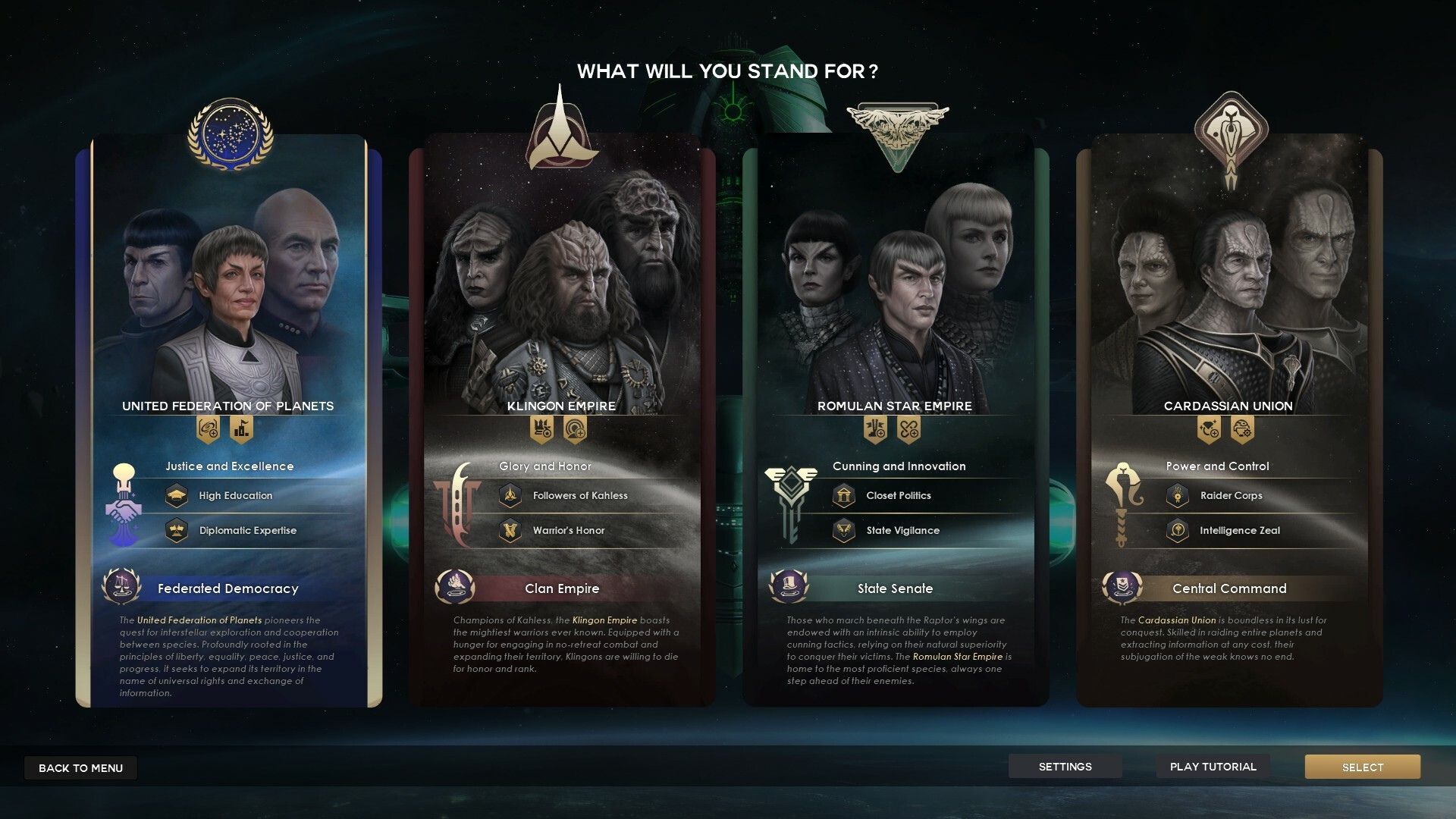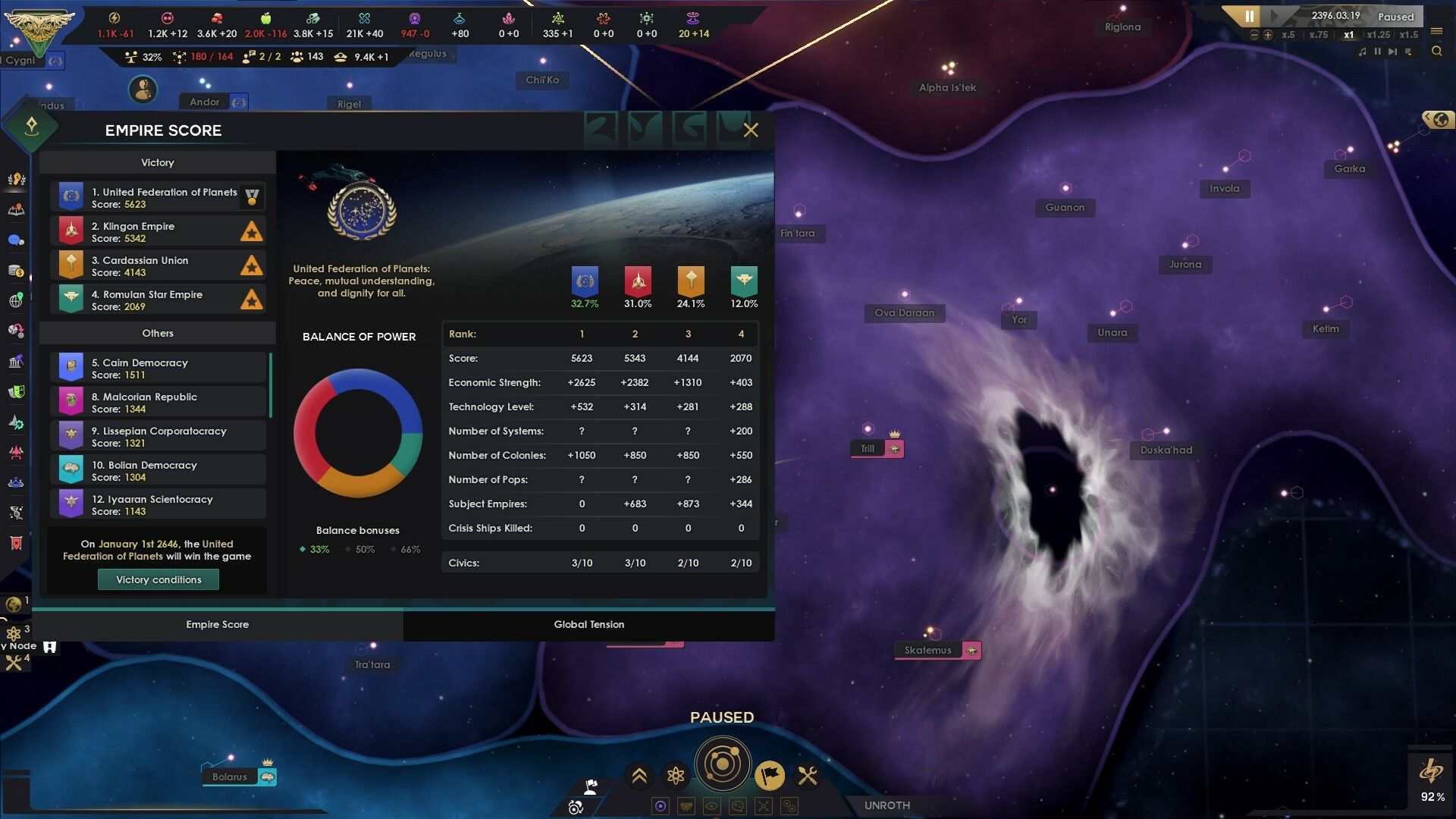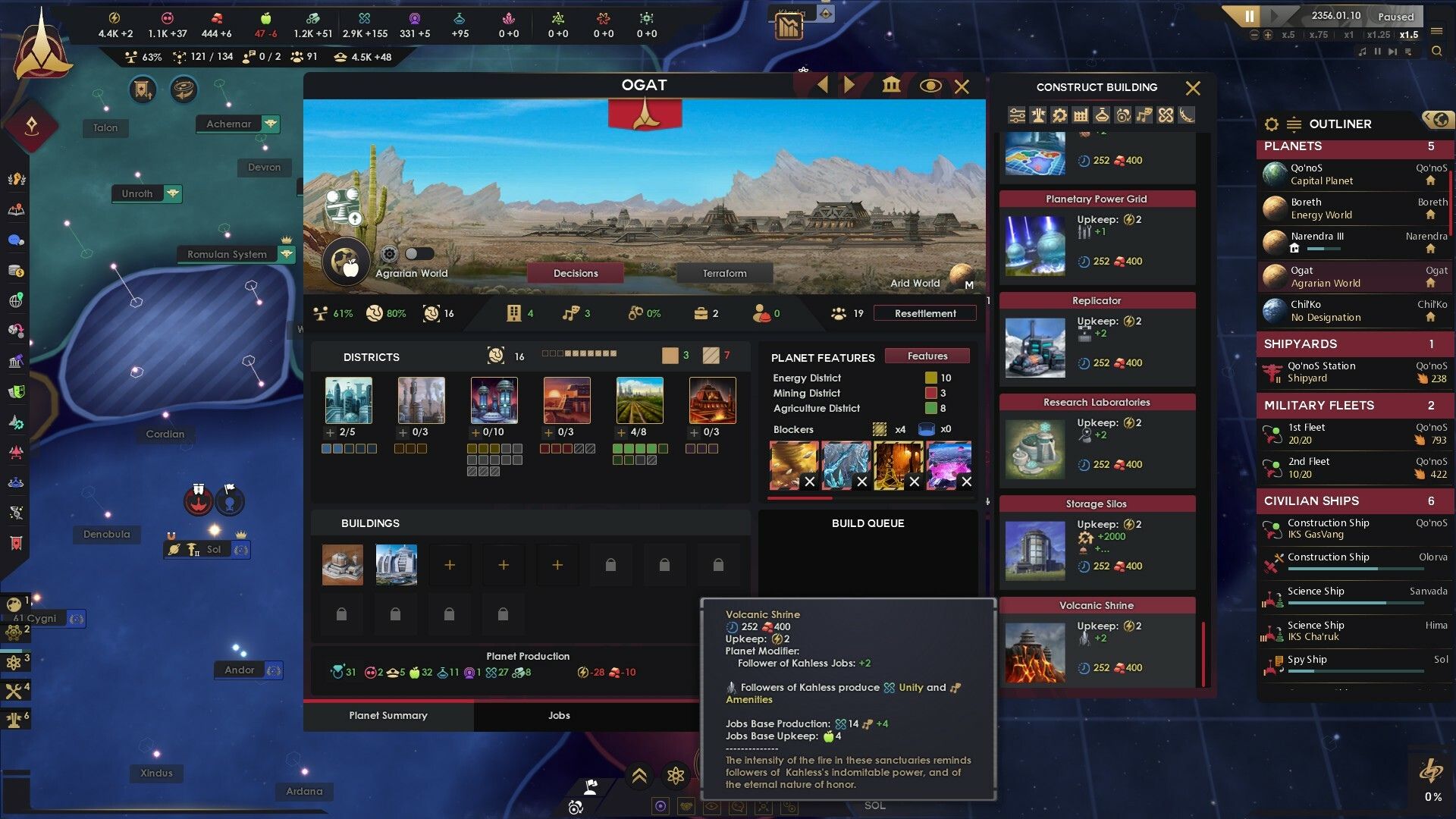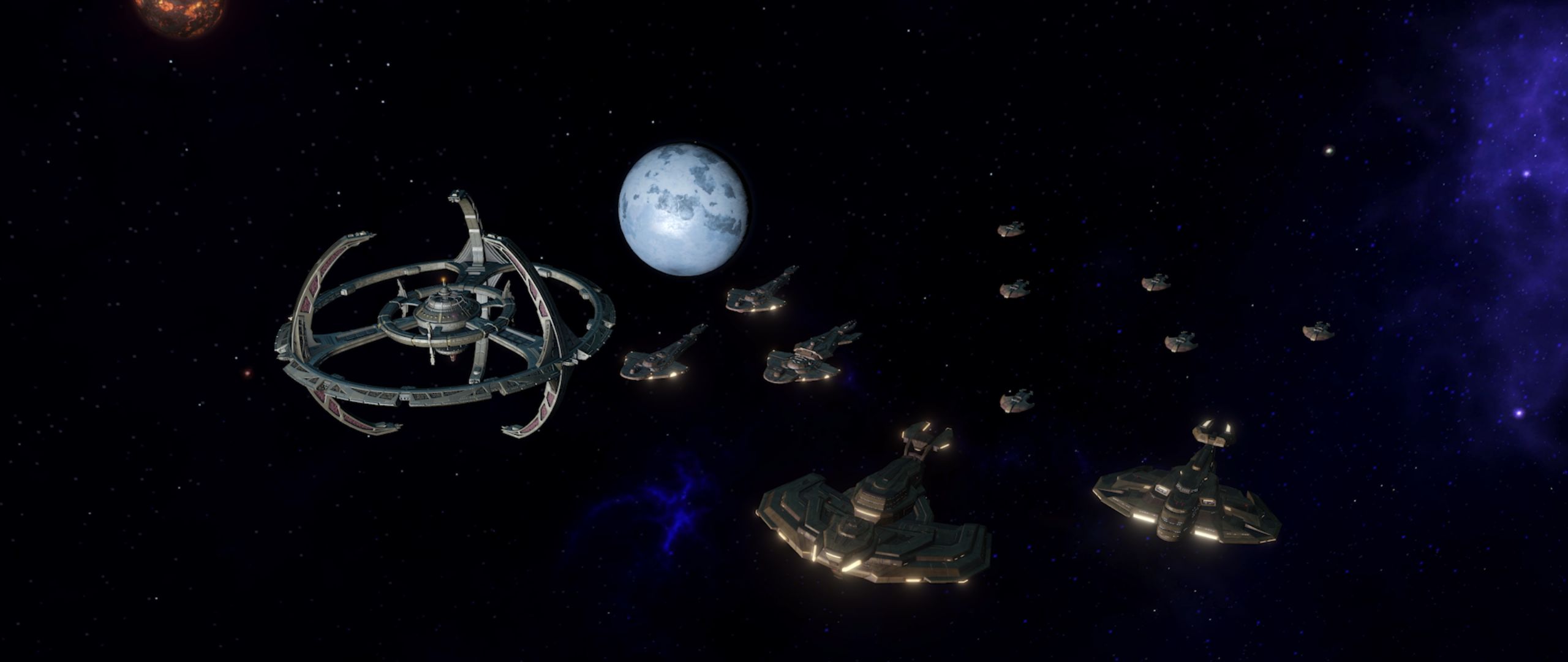TechRadar Verdict
A deep and interesting Star Trek game that doesn’t quite scratch the strategy itch, but Trekkies will appreciate the chance to explore a new twist on a familiar universe. Still, I found myself itching for the depth of the very similar strategy powerhouse Stellaris.
Pros
- +
Deep Star Trek lore
- +
A focus on boldly going just about everywhere
- +
Builds on familiar Stellaris mechanics
Cons
- -
Feels very limited for a grand strategy title
- -
Only four playable races
Why you can trust TechRadar
Platform reviewed: PC
Available on: PC, MacOS
Release date: October 12
Star Trek: Infinite sure is boldly going, but where it’s going to is a place I'm familiar with. It feels lazy to point at the empire-building 4X strategy (the 4 X’s stand for explore, expand, exploit, and exterminate) Infinite and mention that it’s just a reskinned version of Paradox’s own space-based Stellaris but after 25 hours with the game, I’m fairly convinced this is little more than a $30 licensed mod for that game.
The thing is, if you’re okay with the deep sci-fi and you don’t need a lot of people prancing around in red leotards to have a good time Stellaris is already a fantastic Star Trek game. You explore galaxies, make first contact with a host of different alien races, and ally up in big federations to bend the galaxy to your will before inevitably teaming up to contend with one of several end game crises, the sentient species desperately banding together to try and survive.
Want to be the bad guys? Since Stellaris was released back in 2016 several official expansions have fleshed out every part of the game so the only real caveat is… how bad do you want to be? Want to be a people-eating machine horde? A shadowy megacorporation? A warlike race of mushrooms that are trapping any worlds in impenetrable bubbles that doom them to life on a single planet? You can do all of those.
For Star Trek fans, the universe often remixes itself with the only true thread being a love of big philosophical questions and space lasers. Stellaris has all of that, so a cut-back version that has a license and a slightly off-brand Picard in the keyart feels somewhat superfluous.
But that’s what we’ve got. The key art Picard looks a bit uncanny valley, and Star Trek: Infinite has just four playable races (evil Vulcan Romulans, the boring good guys the Federation, my eternal warbuds the Klingons, and the Cardassians) and it feels so limited compared to the two existing Star Trek total conversion mods that already exist for Stellaris I’m not really sure what the point is.
Set phasers to… eh

Unrelated, but did I mention that Star Trek: Infinite costs $30? While the total conversion mods for Stellaris are free and don’t make Paradox any extra money? I did, and that’s because it’s hard to think about anything else after a few hours of playing Infinite.
There are a couple of twists on the formula, but the biggest change is also the worst: play Stellaris and you’ll start on a single planet and slowly map the stars. Pick one of the four races in Infinite and you’ll drop into a universe that’s already carved up, and it feels like you’ve dropped into someone else’s run at a grand strategy game, robbing you of the early exploration and instead, the game asks you to immediately grapple with running a handful of planets straight off the bat. God, running the Federation just seems like a lot of work, and it’s stifling.
Sign up for breaking news, reviews, opinion, top tech deals, and more.
In Star Trek Infinite you juggle several different resources and take your empire to dominance in the universe, whatever dominance looks like for you. This might involve you wanting to be an economic powerhouse, militant warmongers, or stealthy diplomats. The beauty is that there are so many different ways to “win”, you can kind of pursue your own path.

Diving into each faction’s focus trees, it’s impressive to see the care lavished on the different races. Klingons will get specific skills to emphasis their… Klingonness, for example.
In a more granular sense, this involves building out a network of space stations to control your territory and then settling inhabitable planets and constructing a series of civic districts, erecting specialty buildings to enhance their strengths. One world might exist to generate energy credits for you, while another might exist to pull together metals and alloys to build out ships.
If you’re wondering how resource management is happening in a Star Trek game when, famously, Star Trek is set in a universe with no system of currency and the complete absence of scarcity, then I would suggest you just roll with it because it would be an incredibly boring strategy game otherwise. Optimizing these planets and creating a material lead to get you a key scientific breakthrough or a bigger fleet to beat your enemies with is the real meat of Star Trek: Infinite.
Story time

While this is happening, narrative events are popping off left and right. You start at a huge canon event in the Star Trek universe, the Khitomer Massacre, and you work through from that point with a series of different narrative beats. Get it right and, depending on who you’re playing as, you can follow the canon along and eventually get your hands on the USS Enterprise and several named characters to tool around the galaxy with. In my first game, where I played as the fighty Klingons, this event led to a jumping-off point for the the race and it was easy to say how the atrocity could cause the Klingon civilization to diverge.
These beats are handled fairly well. Playing as the Romulans will let you feel like a space meanie with the mechanics and narratives coming together to fulfill that fantasy. If you have no imagination you can play as the Federation and be nice to everyone before - presumably - daydreaming about Riker lunging his way around a spaceship bridge. It’s not 100 percent accurate to the events, but that’s often because the races themselves are all pursuing their own goals and things never play out the way they do in the series’ canon. This doesn’t grate too much, but it does mean certain moments like building the Enterprise don’t have the heft they should have.
However in just two games and 30 hours of playtime, I feel like I’ve got the bearing of two of Infinite’s races, and there are currently just four. I’m worried there’s just not enough depth here, especially when - and I’m sorry to bring it up again - Stellaris has a stack of these races and you can even jump into a randomly-generated race and just see what that opens up for you.
I love Star Trek because of that thrill of exploration and the feeling of discovering brave new worlds. You can do that here, but it feels like those far-off stars are just a little too familiar. Paradox famously reinvent their games and work on them over a long time so if I were charitable I could say that this Trek-’em-up will undoubtedly get a host of improvements. I don’t think they’d convince me to return though: the infinite expanse of space already feels very limited indeed.
Accessibility features
As a strategy game with variable time controls, you can pretty much play Star Trek: Infinite at your own pace. There are very few additional accessibility options on offer here though, largely comprised of some multiplayer text-to-speech options and the ability to rescale your UI and subtitles.
How we reviewed Star Trek: Infinite
I played 30 hours of Star Trek: Infinite on PC, spreading my time between a meaty 20-hour save playing as Klingons and a smaller game playing as The Federation. I also re-watched several episodes of Star Trek: The Next Generation, which isn’t strictly necessary, but felt like a good companion to several narrative chains in the game that referenced those events directly.
Our list of the best PC strategy games is bound to provide you with a new game to sink some hours into.

Jake Tucker is the editor in chief of TechRadar Gaming and has worked at sites like NME, MCV, Trusted Reviews and many more. He collects vinyl, likes first-person shooters and turn-based tactics titles, but hates writing bios. Jake currently lives in London, and is bouncing around the city trying to eat at all of the nice restaurants.
